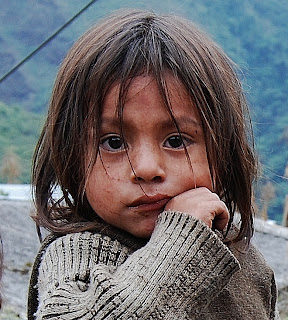We spent last weekend in Pallatanga with a member of the FUNEAP board, Lorena, and her family. Lorena's parents have a country house on the Rio Coco on the outskirts of the town. Pallatanga is a small farming community situated in a valley in the Chimborazo province in the Andes. It's about a 3-hour drive southeast from Guayaquil. The roads from Guayaquil to Pallatanga were in pretty good condition except for one landslide area (which from a distance I thought was a rock quarry... but then we had to drive right through it!).
 |
A truck, already loaded with beans, stopped for crates
of strawberries that were stacked under the awning of
the house in the background, and then continued down
the mountain towards town. |
On Saturday afternoon we went out in search of food, which is how I think the local people spend much of their time when they're not working. Other than a meat shop, a bakery, and a little tienda where it looked like you could buy some odds and ends like eggs, butter, and perhaps a piece of meat hanging from a hook, there are no grocery stores in town. Instead, people set up stalls in the streets where they sell fruits, vegegables, and herbs. Other staples such as cheese, milk, and eggs are sold from the farms or vendors' houses.
 |
| Mami and Raúl bargained for strawberries. |
 |
Although the little children were a bit shy, they appeared to be as
curious about us as were were about them. |
It's strawberry season in Pallatanga, so we drove up a gravel road into the mountains for a scenic outing and in search of strawberries. I have heard strawberries called both "frutilla" and "fresa," and while in Pallatanga I learned that frutilla are a smaller strawberry and fresas are a larger and sweeter strawberry. We drove past several strawberry fields until we saw a woman working in a field with some children playing nearby. She motioned for us to come up her road, and this is where Mami, Lorena's mother, bargained for our strawberries. She bought six wooden crates of frutillas for $4 a crate - crate included; the crate held at least four quarts of strawberries. In Johnson City, I think the deposit for the crate itself is $5-10 dollars.
 |
They may not have hot water or indoor plumbing, but they do have cell phones and technology.
The child in the center took a break from strawberry picking to use an electronic device. |
The people who live in the mountains have had water and electricty for the past five to ten years, but most live in rather primitive conditions. In preparation to go to town, the woman who sold us the strawberries washed up in a large galvanized bucket that was situated just outside the door of her concrete house. The house across the road, typical of those found in the highlands, was constructed of wood planks and a crude metal roof. The children were dirty, although they told Lorena that they take a bath every day. Despite the dirt, I think they are beautiful, and I wonder if they are happy in their innocent ignorance of the modern world (if that's what we can call Cuenca and Guayaquil) that is not so far away. They will have a hard life, as they are expected to help the family work in the fields at a young age.






















